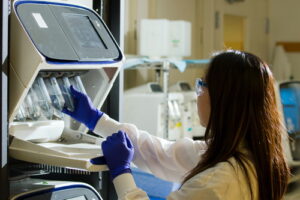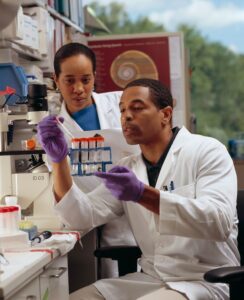What is the Difference Between Natural Antibodies and Monoclonal Antibodies?

Monoclonal antibodies (mAbs) are similar to antibodies produced naturally by the body in response to an infection, but these guys are made artificially in a laboratory. That’s where the term monoclonal comes from. It means they are antibodies created in a lab and are cloned.
Same as natural human antibodies, monoclonal antibodies are designed to resist a virus by recognizing the spike protein in its cell’s outer coat. This makes it quite convenient for lab scientists and technicians to target a specific virus. In this case, Covid.
In doing so, the antibodies block the ability of the virus to replicate inside the body, giving the immune system more time to mount its response against COVID-19 infections.
Who Does Monoclonal Antibodies Help the Most?
Monoclonal antibody infusions are particularly helpful in patients with compromised immune systems, who would find it difficult for their bodies to naturally resist the virus, but it helps healthy people who have caught the virus also, as many have stated that then start feeling better after about 24 hours.
Are Monoclonal Antibodies Only Used for Covid?

No. Other monoclonal antibodies work as immunotherapies (treatment that helps the immune system fight cancer), as they allow your body’s immune system to react better, which then allows your body to more effectively find and attack tumor cells. Show Source Texts
Some monoclonal antibodies are attached to a chemotherapy drug to give treatment directly to cancer cells, avoiding healthy cells. Once attached, antibodies may cause other parts of the body’s immune system to destroy cells that harbor an antigen (molecules that induce an immune response).
Once attached, antibodies draw in immune cells to destroy the tumor cells. The antibody latches onto a particular molecule on the surface of a problem cell.
Are Monoclonal Antibodies Connected to Other Drugs When Infused into a Patient?
As previously mentioned, they are made in a lab to combat a specific infection. They can be injected naturally, called Naked mAbs which means that they are not attached to other drugs such as Brentuximab, which is a chemotherapy drug used to fight cancer cells.
How monoclonal antibodies can be injected into the body is broken down into essentially three categories:
-
-
- Naked Monoclonal Antibodies: These work as a solo drug without any attachments or connections to other drugs. This treatment category is the most commonly used.
- Conjugated Monoclonal Antibodies: An additional drug is added with the mAbs, such as with a chemotherapy treatment or a radioactive compound, both used mostly when fighting cancer.
- Bispecific Monoclonal Antibodies: Used to target two different proteins at the same time.
-
Side Effects
When the antibodies are injected into the body, usually intravenous, an allergic reaction may occur, but these side effects are not life-threatening. Some of the effects a patient may incur are fever, headache, nausea, low blood pressure, and/or rashes.
Final Thoughts
Lab-designed antibodies are ongoing research, but what has been done so far has proven to be worthwhile and fairly successful. Most promising is that researchers can create the antibodies to target specific pathogens depending upon what disease they are working on, such as Covid or cancer.
Antibodies may be designed to attach to various molecules in the body, such as turning off an immune response when it is overreacting; this phenomenon, which has also occurred with some Covid-19 patients, is called a cytokine storm, which are proteins that control the growth of immune cells. They help the body’s immune system to do its job properly.
